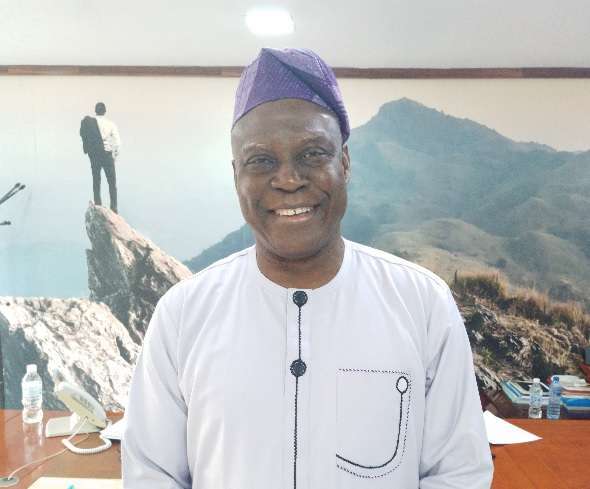
In this exclusive interview with MOSES DIKE, the managing director of Fidson Healthcare Plc and immediate past chairman of the Pharmaceutical Manufacturers Group of the Manufacturers Association of Nigeria (PMG-MAN), Dr Fidelis Ayebae, assesses the impact of the N100 billion pharmaceutical intervention fund given to local pharmaceutical manufacturers, in the wake of the COVID-19 pandemic. He also decries the current economic challenges in the country and the exit of pharmaceutical companies. Excerpt.
How would you describe the current economic situation in the country, especially, as it affects Fidson Healthcare and other stakeholders in the pharmaceutical industry?
Nigeria is faced with very challenging times, both in micro and macroeconomics, monetary or fiscal policies. All of these are very difficult to juggle and they are chiefly responsible for how companies perform. When these indices, including inflation, are stable or predictable, it makes it easy for you to plan or project and run your business better.
But times like this are times that you cannot predict. You can only guess or try to figure what is going on in the mind of the government and its agencies. Within all of these, you would have to find an acceptable position to do your business. This is what is responsible for the good or bad performance of companies.
To God be the glory, we are complaining but we are doing well. Even Dangote, who is the richest man in Nigeria, is complaining. That said, my advice to upcoming entrepreneurs is not to be discouraged but to put on their thinking cap. Secondly, they should know that we have no other nation and we can’t all japa.
We can’t all be cowardly and pretend that somebody will come from the sky and solve all our problems when we japa. At some point in our lives, we would still return to Nigeria. So who would we have left behind to solve the problems of Nigeria? Those of us who are entrepreneurs must live with the reality that we have only one country and therefore must be true to ourselves.
Again, you must spend within your means, either in business or personal life. Avoid ostentatious lifestyle. Do not over-trade. Know what working capital your business requires and make effort to get it on a long-term or medium-term basis – but certainly not on a short-term basis – because that can kill.
Above all, know that stock is king. Cash is king. The good times will come and when they do, if you have no stock and you have no cash, you will be cleaned out.
In light of current economic realities, how has government policies on ease of doing business translated into reality?
The truth is that there is no ease of doing business when there are all of these crises earlier enumerated. Registering a business in 24 hours is not ease of doing business. When all of these indicators that I mentioned earlier are predictable, that is when you can really do business with ease. Some of those artificial points on the ease of doing business are out of the window as we speak.
The Nigerian situation is such that we have to rebuild the economy from the beginning. You can’t even solve FX problem without drilling more oil and selling more oil. Even if you solve all the other problems, your FX overhang would be staring you in the face. So, the first thing is to maximise potentials in the oil and gas sector, while addressing the other issues.
There are fundamental issues that need to be addressed before business can be done with ease. You have infrastructural problems, double taxation, electricity problems, and unstable FX rates that are affecting your duty payment, your LC charges, Form M rates that finally translates to the unit cost of the product and this has increased the unit cost of products by over 60 per cent.
Now, the question is, how do you sell something that is constantly increasing when the purchasing power of the populace is constantly diminishing? This is why we need to quickly stem the entire slide and find a way of ensuring that we put more money in the hands of the consumer.
Again, we have unfortunately found ourselves in a situation where we have made the dollar an almost indispensable currency, such that, even people who do not need dollars for business are taking it for other purposes. When everybody is doing this, the implication is that you will need more dollars. When you have more dollars through foreign direct investment, through increased oil sales and others, that is when you stem this tide of everyone running around chasing the dollar, as if it is the only thing that exists.
Again, we have to cut more deals with most of our foreign partners – India, China and the rest of them – in which we can do trade outside of the dollar, build it slowly in the form of commodity exchanges, or use our local currencies.
The japa syndrome appears to be assuming a corporate dimension, as some well-known companies are said to be leaving Nigeria. What steps do you think can be taken to stem this ugly trend?
Well I don’t think there is a magic wand that can reverse this trend. It will continue for a while, until we are able to stabilise, by implementing some of the things I have said earlier.
Stability and predictability in our economy are very key. When there is no stability or predictability of those key indices, foreigners will run. It is a natural process of preserving and protecting values and investment in a country you are not sure is going in the right direction.
That said, the best thing is not for any Nigerian that can afford to japa to do so. Although you cannot stop people, especially the younger people, from having aspirations, but when they go out there, they will see that it’s not as easy as they think it is out there, even for the citizens of those countries. Since this is the situation, it will now become a case of “some years ago, we took you forcefully to come and slave for us, but today you are now volunteering yourselves to come.” So, whatever you see, you will have to take.
It is now left for those of us that love this country and that this country has given so much to, to stay put and work with the government to salvage this situation. It is not the time for us to chicken out of a challenge that is solvable.
We are not going to collapse as a nation. Therefore, let everybody stand up and be counted as part of the solution, rather than the problem. While you are alive, use your money to make a bad situation better. That is how to add value. Even all the politicians that are stealing money here and there and hiding up and down, what are they going to do with the money when they die? For some, their families don’t even know where the money is. This selfishness is not leading us anywhere. Rather than this, let us join hands to build a vibrant economy, where everybody will survive and be happy.
We have smart people out there that can solve Nigeria’s problem. It is the ungodliness and selfishness of a typical Nigerian in leadership or position of responsibility that is compounding our problems. Imagine, if, as businessman today, I started stealing the money belonging to the shareholders and stashing it away – maybe in foreign countries like Australia, Switzerland, Canada and the rest of them – what would happen to our dream of building a vibrant corporate institution? Our problems would be compounded and we might close down. Of course, I might have money stashed somewhere, but I would end up being a lonely and miserable person out there for the rest of my life. This is what is happening to Nigeria and our economy.
How is Fidson managing to navigate these challenges?
Nothing good comes out of complaining. We have challenges like every other person but the thing is that we must remain focused on the goal. What is the goal? To run a successful enterprise that is sustainable and is returning consistent values to all stakeholders.
Investors don’t care what problems you have. They gave you money at the time they bought your shares and you promised to return value to them. So, your role is to ensure that you are constantly moving and adapting. Ensure that your reflexes, in terms of planning or reactions, as a team, are swift.
Recently, Nigerians were alarmed when the news of GSK’s exit was announced. As an industry stakeholder and former chairman of PMG-MAN, what is your reaction to this and how prepared are we to fill this vacuum?
To be honest with you, the exit of GSK is heart-breaking. When things like that begin to happen, it shakes an industry, because GSK is not an ordinary company. To start with, GSK is part of the history of the Nigerian pharmaceutical industry and the fact that GSK is here confers credibility on the Nigerian pharmaceutical space.
Their exit may be part of a business decision that was made because of the challenges that Nigeria is facing. They may come back if things get better. There is nothing stopping them. The market is on free entry and free exit basis. I am sure that it was not an easy decision for them to make.
They are not leaving with talents but they are leaving with those platforms that would have helped the pharmaceutical industry. But, having said that, we are not going to die. The rest of us have to fill the vacuum. Filling the vacuum is not a very difficult thing because the products that they provide are also products that we either manufacture locally or import from other sources. There are plants here that can manufacture those things. So, it is now left for the people that have the plants to seize the opportunity of the exit and take advantage of the vacuum that will be left for a while, pending when they sort themselves, in terms of getting a local distributor and other things.
For those of us that are left, it is a wake-up call to the government to continue to strive to create enabling environment for businesses to thrive more easily. So long as these difficult situations are there, no entrepreneur will invest or create businesses that will create more employment opportunities.
Now that it has happened, we should all sit down and work hard to develop our pharmaceutical industry, like the Indians and the Chinese. Even countries like Bangladesh that are not as buoyant have built their national drug capacity to 98 per cent locally manufactured and 2 per cent imported. This is same for countries like Malaysia, Indonesia and the rest of them. It is now left for all the key players in policymaking and the private sector to sit down and map out ways to grow like these countries.
In the wake of the COVID-19 pandemic, the Central Bank of Nigeria (CBN) launched an intervention fund to assist local pharmaceutical to increase capacity. Some years down the line, how would you assess the impact of the intervention fund on the industry?
Let me, first of all, thank the Federal Government and the former CBN Governor, Godwin Emefiele, under whose watch that initiative happened. Let me also thank the Director General of NAFDAC, Prof. Mojisola Christiana Adeyeye, who worked with the CBN. I also thank our friends and our bosses at the Manufacturing Association of Nigeria (MAN) national secretariat for working very swiftly with all stakeholders when there was a problem in the world and then came up with the intervention fund.
For those of us that got the fund, it was timely and fantastic. It is the way to build the industry. It is the way to capitalise the industry. Some, when they got the money, built brand new greenfield plants that are ready today or working already.
At Fidson for instance, we installed two additional infusion lines, including a dialysis fluid line. Even though we added more money to be able to do that, it was very helpful because it was at 5 per cent for two years. That is how an industry like the pharmaceutical industry that is in perpetual emergency should be treated. There should be a pharmaceutical fund, a pull of funds, that is in the region of N500 billion, that government can put together, through development banks or through sovereign wealth fund that we can go to, for long-term funding.
If you want to manufacture 70 percent of your local therapeutic needs, it is not going to happen overnight. It requires funding because every single thing to do that is going to be imported and the areas that will require intervention are many.










